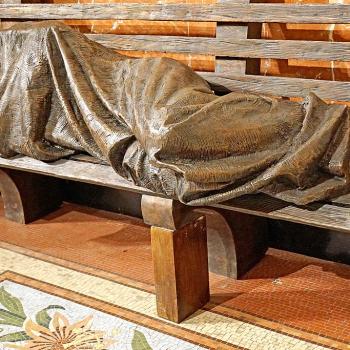
Throughout his ministry, Jesus promoted human dignity. Jesus went to those who were denied it by society. This is one of the reasons why religious and secular authorities did not like him: they saw his actions as undermining their power, a power which in part, centered upon a construction of society which supported and promoted a few and denigrated the rest. Instead of disassociating with those treated, if not actually deemed, as subhuman because of what they did (such as prostitutes and tax collectors), or because of their social status (such as the Samaritans and the poor), Jesus joined himself in solidarity with them. He proclaimed their inherent human dignity, but showing that God’s love was for them as much as it was for those whom society idolized. Often, he pointed out how social outcasts were of a nobler character and possessed greater faith than those who demeaned them. He did this in many ways, sometimes letting those who were being undermined come to him and prove their worth to others, sometimes by going to them and simply showing his love and support for them without any hesitation.
Christians should have learned to deny any religious zealotry which seeks to undermine human dignity. While, initially, when Christians had little power or authority in society, they had little difficult promoting the dignity of all humanity, once they found themselves holding secular power, they quickly found reasons to justify dehumanizing others. Jews and pagans, and many fellow Christians, were denied basic human rights as they were demonized. Slavery, torture, pogroms, all were justified because Christians lost sight of the dignity of the human person.
While there were some who saw through such dehumanization of the other, and saw how it went against the teachings of Christ, for the most part, Christians gravitated to such an ungodly ideology and let it create a perverted notion of Christianity which then imposed itself upon the world. Certainly, official Christian doctrines would imply we should not accept the kind of social order which ensued, which is why we can find, throughout the centuries, teachings which were not properly lived out, making it seem that things were better than they were if we only read history through the lens of such teachings. But we must remember, Christians have a long history of hypocrisy, saying one thing and doing another. Christians and their institutions often can speak the right words but fail to live them out.
Christianity had to come face to face with its moral teachings by seeing them lived out better by non-Christians than by Christians. Christians could not just speak in a generic sense of the dignity of human nature, and therefore, of humanity, it must promote the implications which follow once that dignity is understood. Vatican II’s teaching on human dignity can be said, in this way, to be both traditional and revolutionary; it is traditional because it can point to and show the constant teaching of the faith which leads to the promotion of human dignity; it is revolutionary as it fights against all the justifications which have gone before it that allowed Christians to ignore its teachings and to act contrary to them. Every person possess within them human dignity, a dignity which cannot be lost, and Christian teachings can and should be used to explore what this means in regards the way we treat others:
One of the salient features of the modern world is the growing interdependence of men one on the other, a development promoted chiefly by modern technical advances. Nevertheless brotherly dialogue among men does not reach its perfection on the level of technical progress, but on the deeper level of interpersonal relationships. These demand a mutual respect for the full spiritual dignity of the person. Christian revelation contributes greatly to the promotion of this communion between persons, and at the same time leads us to a deeper understanding of the laws of social life which the Creator has written into man’s moral and spiritual nature. [1]
This dignity must be more than an ideal. It must be engaged:
Furthermore, whatever is opposed to life itself, such as any type of murder, genocide, abortion, euthanasia or wilful self-destruction, whatever violates the integrity of the human person, such as mutilation, torments inflicted on body or mind, attempts to coerce the will itself; whatever insults human dignity, such as subhuman living conditions, arbitrary imprisonment, deportation, slavery, prostitution, the selling of women and children; as well as disgraceful working conditions, where men are treated as mere tools for profit, rather than as free and responsible persons; all these things and others of their like are infamies indeed. They poison human society, but they do more harm to those who practice them than those who suffer from the injury. Moreover, they are supreme dishonor to the Creator. [2]
Discrimination which dehumanizes the other, especially based upon their beliefs and religious practices, but also due to their own social condition, must be rejected: “No foundation therefore remains for any theory or practice that leads to discrimination between man and man or people and people, so far as their human dignity and the rights flowing from it are concerned.” [3]Ultimately, we must understand that any dehumanization of the other is an affront on the image and likeness of God found within every human person.
Everyone has been given freedom. To protect human dignity, therefore, we must protect such freedom:
Freedom that is conscious of its own dignity will always respect the freedom of others. It will be in solidarity with their freedom, and will stand up for it. Freedom, therefore, is not “freedom from others,” but “freedom with and for” others. Freedom is realized in justice, which gives everyone his or her due. Freedom concretely presupposes that everyone else will respect their own freedom. It presupposes thereby a system of justice, that is, at the same time, a regulated system of freedom. [4]
We must be agreeable with each other, looking to promote and support each other, for it is only in that spirit can we truly show the kind of wisdom expected from us. “The agreeable person is also compassionate; the compassionate is also genuine; the genuine is also reliable in counsel.” [5] Those who look down upon the other and try to justify ignoring their human dignity might be smart, they might be crafty, but their counsel is not trustworthy because it does not look at humanity in light of the goodness God gave to it at its foundation, a goodness which sin can never entirely destroy. Those who deny that good, those who deny human dignity, do so in order to promote themselves over the greater good. They justify abuse by saying the other is unworthy of anything else, but they do so as all abusers do, that is, as a control mechanism.
St. Leo the Great said, in order to overcome vices, those terrible evils which turn us away from the good which we are expected to follow, we must promote the dignity of all (including ourselves), looking to what makes everyone dignified (being made in the image and likeness of God):
If there is present any love of vainglory or any root of avarice or germ of hatred, let the soul take nothing of such food, but, intent on the delight of virtues, let it place heavenly feasts before earthly pleasure. People should acknowledge their own dignity and see themselves as “made in the image and likeness of” their Creator; they should not become so terrified from the suffering which they meet through that great common sin that they do not bring themselves to the mercy of their Redeemer. [6]
The common dignity of all will be easily ascertained in the eschaton, as the distinctions which we make to justify the dehumanization others will have no support:
At that time there will be no distinction between the noble and ignoble, priest and layman, slave and master, maidservant and mistress, rich and poor, lender and the one who is overwhelmed by debt, buyer and seller. For everyone will stand on equal footing before the tribunal of Christ [cf. Rom 14:10], and there will be “no acceptance of persons with God” [Col 3:25]. [7]
As Christ is the immanent eschaton, we, who put on Christ, we, who say we believe in him and put our faith in him, must act as he acted, which is to bring the eschatological truth to the world. We must level distinctions which undermine human dignity. We must help everyone find themselves on equal footing. Yes, we will do so imperfectly, for the full realization of this truth will be found in the transcendent, not-yet aspect of the eschaton. Nonetheless, we should always strive for it, making things as best we can. And, like Christ, we should be critical of those who resist our eschatological engagement, those who deny our desire and work to improve society by continuing to promote the dehumanization of the other. This is our work in the world. As we put on Christ and become christs in Christ, we are to live in the world in such a way as to let Christ live in us, to let Christ work through us, and so to let Christ’s eschatological grace enrich the world and its history.
[1] Gaudium et spes. Vatican translation. ¶23.
[2] Gaudium et spes, ¶27.
[3] Nostra aetate. Vatican translation. ¶5.
[4] Walter Kasper, Mercy. Trans. William Madges (New York: Paulist Press, 2013), 200-1.
[5] St. Gregory of Nazianzus, Gregory of Nazianzus’s Letter Collection. Trans. Bradley K. Storin (Oakland, CA: University of California Press, 2019), 85 [To Eudocius, Ep. 216].
[6] St Leo the Great, Sermons. Trans. Jane Patricia Freeland CSJB and Agnes Josephine Conway SSJ (Washington, DC: CUA Press, 1996), 392 [Sermon 94].
[7] St. Jerome, Commentary on Isaiah in St Jerome: Commentary on Isaiah; Origen Homilies 1-9 on Isaiah. Trans. Thomas P. Scheck (New York: Paulist Press, 2015), 387.













